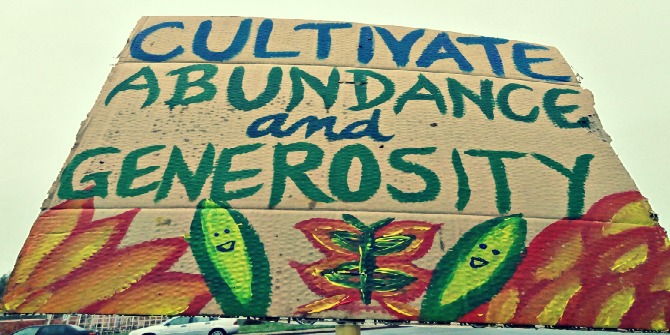Food Activism offers a contemporary anthropological view of a range of social movements and their relationship with power through food. Chapters cover local movements in Seattle and Kyoto, and national actions in Canada and Egypt. Elaine Kellman highly recommends this collection for ethnographers and for students and scholars in anthropology.

Food Activism: Agency, Democracy and Economy. Carole Counihan and Valeria Siniscalchi. Bloomsbury. December 2013.
“Food has long been a focus for political and social movements in many parts of the world; food is a potent symbol of what ails society, a way of making abstract issues like class or exploitation into a material, visceral reality.”
– Richard Wilk
Emotional, cultural and political aspects underpin the production, distribution and consumption of food. Food is linked to identity – “tell me what you eat and I’ll tell you who you are” (The Physiology of Taste) – and forms an intrinsic part of our cultural, social and community profile. Food production, distribution and consumption pervade all aspects of life and are also inextricably intertwined with power and politics: as food writer Michael Pollan asserts,“[one] can learn an enormous amount about capitalism studying food”.
Notwithstanding the unique universal essentiality of food, the forging of economic systems around a global axis has shifted the apex of food systems from state-level to transnational systems of food production and distribution. These transnational systems are often controlled by corporations motivated by profit, with no interest in sustainability, social justice, or the societal context of food. At the same time, the increase in food-related societal problems is well documented: on the consumer side there are increases in levels of hunger, obesity, and food-borne illnesses, on the producer side, farmers and other producers are suffering from decreasing incomes, and threats are posed to the sustainability of food production from factors including climate change, rising world population, a dwindling resource base and other planetary boundaries.
It is against this background that food activism movements are emerging across the globe: challenging existing systems and suggesting new sustainable methods of socially just food production, distribution, and even consumption.
Food Activism: Agency, Democracy and Economy, edited by veteran food anthropologists Carole Counihan and Valeria Siniscalchi, is therefore a timely contribution to the sphere of food studies. For Counihan and Siniscalchi, food activism takes aim at the “capitalist system of production, distribution, consumption and commercialization with the common goal of controlling or taking charge of production, distribution or food choice”. Food Activism therefore presents a collection of contemporary research that covers a varied range of activism, practiced by “political activists, farmers, restaurateurs, producers and consumers” and including movements such as fair trade, urban agriculture, co-operatives, anti-GMO, and slow food activism. It also covers a wide geographical sphere with case studies in countries including Cuba, Mexico, Colombia, Sri Lanka, Egypt, Japan, Italy, France and Canada.
There are some particularly interesting chapters in Food Activism that highlight the diversity of topics covered: for example, Nefissa Naguib explores Islamic food activism in Egypt in the aftermath of food price protests, while engaging with contemporary concerns about religion through food; Teresa M. Mares discovers the lack of engagement of Latino immigrants in urban agricultural projects in Seattle and Delphine Thivet analyses the transnational mobilization for food sovereignty by social movement La Via Campesina (explored further below).

However, the introductory chapter “Ethnography of Food Activism” by Counihan and Siniscalchi, is an essential starting point for any reader. Situated within the increasing body of anthropological work on food activism, contributors to Food Activism are primarily linked by their ethnographic methodology (leading to an empirically opulent book). However, throughout Food Activism, the divergence of ethnographic approaches is obvious, with contributors differing in their vantage points and objectives (reflecting the difficulty inherent in ethnographic methodology of determining the correct balance between observation and participation). These differences can make the chapters of Food Activism appear disjointed and even divergent. The introductory chapter is therefore essential for: (i) its interesting analysis of the thematic axes running through Food Activism – connecting the contributions and food activism movements through their relationships with power, agency, democracy and economy – and (ii) its important insights into “food activism” as an umbrella concept.
Food Activism explicitly aims to contribute to studies that take a global approach to food activism. However, of the three substantive parts forming Food Activism, only the third – and most interesting – focuses on “transnational networks”. The remainder of the book is absorbed by commentary on “local engagements” and “national actions” and it is therefore difficult to see connected transnational flows of food activism reflected in these chapters, other than an implication that activism is taking place worldwide under a global umbrella of “food activism”.
Delphine Thivet’s study of the “Peasants’ Transnational Mobilization for Food Sovereignty in La Via Campesina” therefore stands out for the truly transnational focus of the activism it details. La Via Campesina is a transnational social movement that was born to oppose what were seen as “negative social impacts of neoliberal economic globalization of agriculture.” It represents approximately 200 million members from seventy countries. Unhappy with the concept of “food security” (coined and advocated by the FAO/World Bank), La Via Campesina created the concept of “food sovereignty” which calls “the right of each nation to maintain and develop its own capacity to produce its basic foods respecting cultural and productive diversity”. Thivet demonstrates how La Via Campesina: (i) framed the concept of food sovereignty through an imaginative reshaping of existing human rights language and food security discourse; (ii) challenged the invisibility of small peasants by asserting their status as “food producers”; (iii) is committed to social change through the promotion of self-reliant farming based on “seed sovereignty” and “agro-ecological practices and challenges to the inequalities of power in the food system through a feminist orientation”.
Of particular interest is Thivet’s clever exploration of the expansion and exploitation of the multivalent character of rights by La Via Campesina. By departing “from a narrow individualistic, depoliticized and state-dependent bias apparent in international standards” and “advocating a “peoples’ right”, they insisted on self-determination and on the socioeconomic and political prerequisites essential to the realization and enjoyment of human rights”. Although probably outside the scope of Food Activism, and therefore this review, this transformative exploitation of human rights discourse perhaps reflects a wider development of human rights’ potential to encompass at least some forms of transnational community rights.
In conclusion, the contributions embodied in Food Activism are broad and speak to a range of interests, topics and viewpoints. Each chapter is successful in demonstrating how people “choose food as a means of forging social and economic justice”, and the editors carefully and cleverly guide the reader through an exploration of contemporary food activism. The strength of Food Activism lies in its ability to cover diverse areas of activism and the editors’ ability to find thematic axes connecting them. However, in some respects the diversity of topics covered is also the book’s weakness – the editors’ decision to adopt an “inclusive” approach means that some chapters focus on extremely narrow analysis regarding food activists that are based only in a particular town, or even on specific individual activists. While such discourse is no less important than those presenting a transnational or global outlook, these chapters can sometimes appear disjointed to a reader more interested in a wider picture of food activism.
Food Activism offers a contemporary anthropological view of a range of social movements and their relationship with power through food. It is therefore highly recommended for students and scholars in anthropology and ethnographers. However, it is also a worthwhile read to those interested in food studies, activism (local, national and transnational), social change movements, politics and social and economic justice.
——————————-
Elaine Kellman is a PhD candidate at the Dickson Poon School of Law, King’s College London. Elaine’s doctoral research is focused on natural resources (food, water, energy and minerals) and international trade law, and explores the equitable allocation and distribution of these essential natural resources through trade. Elaine holds an LLB (Laws) and LLM (Public International Law), both from King’s College London, as well as postgraduate practice diplomas in International Human Rights and International Competition Law from the International Bar Association/College of Law. Elaine tweets @ElsKells. Read more reviews by Elaine.








1 Comments